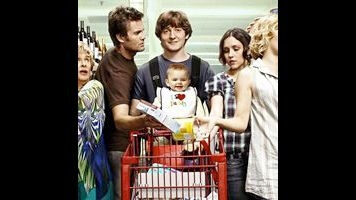Raising Hope is one of the few shows on American TV set in a world that resembles the one inhabited by many of the people watching it: a blue collar Nowhereville where people make rash decisions when they're young and spend the rest of their lives trying to distract themselves from regretting them. It's an exaggerated take on that world, but not as cartoonish as Garcia's previous hit, My Name Is Earl, which at its broadest (and often at its funniest) suggested a TV version of Raising Arizona that had its name changed by the Witness Protection program. Raising Hope is a sweeter take on white trash life, with characters whose brash dimness can't quite conceal the fact that they do care about each other. Early on, some critics accuse the show of having a snobbish contempt for its own characters, a charge that Noel addressed, and ably parried, in this space last week. The gross-out humor and sick jokes, which at first made the show look a little abrasive, and which are integral to a show that has a running gag about whether the grandmother (Cloris Leachman, giving a performance uninhibited enough to make her turn in Bad Santa look like Judy Dench playing the Queen Mum) is enjoying one of her rare vacations from senile dementia and that wrote the hero's baby mama out by strapping her into the electric chair (to everyone's great relief), actually provide a useful counterbalance to the show's warm, mushy heart. The peculiar thing is that Raising Hope's biggest problem, when it starts sputtering, is the same one that kept tripping up Running Wilde: It sometimes throws itself off course in its scattershot pursuit of any gag that might score a chuckle and kill a few minutes.
"Mongooses" was one of the weaker episodes, with a central conflict that a generic sitcom plot generator might have coughed up to see what last remaining traces of juice a motivated but desperate writing team could wring out of it: Jimmy, suddenly driven to contemplate his mortality, sets off a bidding war among his parents by trying to decide who should be Hope's official guardian. For me, the choicest bits were those throwaway, slice-of-life moments that the show has come to specialize in that are half "It's funny because it's true!" and half Addams Family, such as Burt itemizing all the things he does every morning to set the stage for the world that his wife and son are to wake up into, such as "clean[ing] all the ants out of the bathroom so Virginia's not freaked out when she has to brush her teeth." (Raising Hope has done a great job of adding to the storehouse of that precious resource we call "great Garret Dillahunt moments.") The big underdeveloped moment came when Jimmy informed Sabrina that he wanted to put her at the head of the line of people who would be asked to care for his baby if anything happened to him. I've seen a lot of variations, in real life and the other kind, on the act of breaking it to someone that you're way more into them that you ought to be, but this counted as a breakthrough, and Shannon Woodward's expression on receiving the news was one for the time capsule. Sadly, it turned out that she was mostly put off because she was fearful that she wasn't up to the task. Raising Hope sometimes threatens to get into something richer than they can handle, or at least wrap up in 20-minutes plus commercials.
Even when Raising Hope's treatment of its characters turns a little half-assed, you can still have fun observing its gamesmanship with sitcom conventions, such as the moment when it looked as if the moral of the episode was going to be that becoming competent enough to escape the coils of co-dependency destroys family chemistry. ("Who would have thought being semi-helpless is half of what keeps families together?" "Man, I bet families with blind people in 'em are really tight!") The actors unwrapped that nugget so tenderly that when the real moral—i.e., Sabina's discovering that she was, in fact, Hope's ideal protector—arrived, it was surprisingly stirring, given that it involved her drawing Cloris Leachman's gunfire and tackling the batty old thing after Maw Maw had cornered the characters in the attic after mistaking them for an infestation of mongooses. Raising Hope is unlikely to ever develop anything like the angry undertones that distinguished Roseanne, the last great non-animated working-class sitcom, but if it could focus more intently on the painful comic possibilities on the messy tangle of the characters' feelings for each other, it could really kick out the jams.
Stray observations:
- This was the first episode in a while that didn't boast a guest appearance by some cult comedian or character actor god, but the lawyer did look and act as if Jerry Stiller and Regis Philbin had mated. The casting director put that image in my head; now all of us have to live with it.
- Is that the first time we've seen that lovingly executed painting of Xena, warrior princess, in the attic? Is there a story behind it that's waiting to be filled in? I sure hope this isn't turn out to be like the fate of the Russian on The Sopranos.
- "Man, you guys are lucky. Also, you have an obscene amount of beer." "That's for 2012. I figured we wouldn't want to die sober."









































